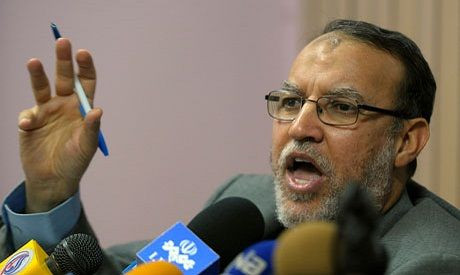Boston Marathon Bombings: It All Began In Mali, Says Muslim Brotherhood's Essam El-Erian

It’s not just Americans who are jumping to completely unfounded conclusions on who may be the perpetrator of the Boston bombings. The Internet is awash with unwarranted speculation about Islamic radicals, U.S.-based militias and the latest darling of the “truther” crowd: a government operation meant to justify a reactionary crackdown on the freedoms enjoyed by Americans.
People who harbor such ideas may be unhinged or at least grossly misinformed or biased, but they aren’t alone.
Essam el-Erian, vice chairman of Egypt’s governing Freedom and Justice Party, which has close ties to the Muslim Brotherhood, is doing some conspiracy theorizing of his own and publishing it on mbinenglish, a site that collects English translations of articles penned by leading Brotherhood figures.
Like many posts appearing on the site, el-Erian’s musings are far from easily readable. They sound like a literal, context-free translation of the writers’ Arabic, with the allusions and the hints in the original text faring poorly in English. But some things are perfectly clear.
“Our sympathy with the families of the victims and the American people do not stop us from reading into the grave incident,” el-Erian writes, already showing in the second paragraph the fundamental flaw of conspiracy theories -- the “reading into” things that are still totally unclear and that, therefore, can yield to any interpretation the writer wants.
And what the writer wants here is to frame Boston into something bigger, something sinister, something that has the goal, of course, of crushing Arabs and Muslims: “This series of events began with the sending of French battalions to Mali in a war against organizations that are said to belong to al Qaeda.”
It’s all downhill from there. You don’t need to read the whole thing: It’s just what is expected, the standard-issue framing of recent attacks in Somalia, Syria and Iraq -- and even of the faltering peace talks between the Turkish government and the Kurdish PKK party! -- within the idea that someone powerful wants to stop the Arab Spring.
“Who disturbed democratic transformations, despite the difficult transition from despotism, corruption, poverty, hatred and intolerance to freedom, justice, tolerance, development, human dignity and social justice? Who planted Islamophobia through research, the press and the media? Who funded the violence?”
But el-Erian is a half-hearted conspiracy theorist. He may reveal the drama, but he doesn’t tell us who did it.
Or does he?
In light of the Brotherhood’s well-documented history of anti-Semitism -- Egyptian President Mohamed Morsi himself is no stranger to controversial statements on Jews, including one last week denouncing a visit to Egypt by U.S. members of Congress as “in service of international Zionism” -- it does not take a giant leap to guess who el-Erian was thinking of.
To be fair, el-Erian doesn’t mention the words “Jews,” “Jewish-controlled mainstream media,” “Israeli lobby in America” or any other of the classic tropes that remain a favorite in cafés and newspapers around the Arab world.
He did not need to. It’s hard to imagine that he was directing his suspicions at, say, Norwegians or Hindus.
This is especially so when a post on the same site, linked right next to el-Erian’s, spews words like this sentence that could have been lifted from a Nazi manual: “It is apparent to anyone with eyes that the Jewish character -- wherever and however it is found -- is never innocent of deviance, free of vice and does not waste a day in pursuit of sowing vice in the world.”
It did not take long for people on Twitter to take notice and excoriate el-Erian. Egyptians did not shy away from condemnation. One tweet summing up the feelings of many came from Cairo.
Essam al-Erian's statement on the Boston bombings really take the prize for combining offense, conspiracy and idiocy: mbinenglish.wordpress.com/2013/04/16/el-…
- arabist (@arabist) April 16, 2013
© Copyright IBTimes 2024. All rights reserved.






















